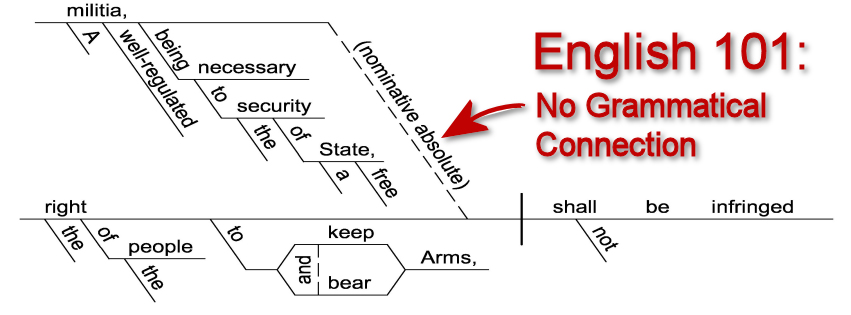What does the Second Amendment mean? This question is at the center of one of the most divisive debates in modern American constitutional law. The amendment itself contains 27 words: “A well regulated Militia, being necessary to the security of a free State, the right of the people to keep and bear Arms, shall not be infringed.” This provision references both the collective right of a militia and an individual right. Does this two-century-old text, then, mean that Americans today have a right to gun ownership and use?
Wrong right from the start.
"A well regulated militia, being necessary to the security of a free State, ..." is a prefatory clause. This has been discussed in innumerable linguistic (or, more properly, grammatical) analyses over the course of decades. Justice Scalia got it right: a prefatory clause is an introduction -- it's background, essentially extraneous. It does NOT alter, amend, modify, or limit the meaning of the core phase. The core phrase of the Second Amendment is: "[The] right of the people to keep and bear Arms, shall not be infringed."
Period. Full stop.
Scalia concluded that the phrase bear arms “unequivocally” carried a military meaning “only when followed by the preposition ‘against.’” The Second Amendment does not use the word against. Therefore, Scalia reasoned, the phrase bear arms, by itself, referred to an individual right. To test this claim, we combed through COFEA for a specific pattern, locating documents in which bear and arms (and their variants) appear within six words of each other. Doing so, we were able to find documents with grammatical constructions such as the arms were borne. In roughly 90 percent of our data set, the phrase bear arms had a militia-related meaning, which strongly implies that bear arms was generally used to refer to collective military activity, not individual use. (Whether these results show that the Second Amendment language precludes an individual right is a more complicated question.)
Further, we found that bear arms often took on a military meaning without being followed by against. Thus, the word against was sufficient, but not necessary, to give the phrase bear arms a militia-related meaning. Scalia was wrong on this particular claim.
"Implied is not "proves." "Often" is not "always." This conveniently ignores the fact that the constitutions of several of the original 13 states specifically mentioned self defense as part of their respective 2A analogs.
Pennsylvania: Article I, section 21. The right of the citizens to bear arms
in defense of themselves and the State shall not be questioned;
Vermont: That the people have a right to bear arms for
the defense of themselves and the State – and as standing armies in time of peace are dangerous to liberty, they ought not to be kept up; and that the military should be kept under strict subordination to and governed by the civil power.
New Hampshire: Article 2-a. All persons have the right to keep and bear arms
in defense of themselves, their families, their property and the state.
Connecticut: Article 1, Section 15. Every citizen has a right to bear arms
in defense of himself and the state.
Delaware: Article 1, Section 20. A person has the right to keep and bear arms
for the defense of self, family, home and State, and for hunting and recreational use.
The anti-gun zealots will never stop trying to "prove" that the Second Amendment doesn't mean what it says. They've been wrong for decades, and they're wrong again. The 2A might as well say, "A ham sandwich, being a good choice for lunch, the right of the people to keep and bear Arms, shall not be infringed."

